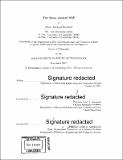The space around BQP
Author(s)
Bouland, Adam Michael
DownloadFull printable version (19.71Mb)
Alternative title
Space around bounded-error quantum polynomial time
Other Contributors
Massachusetts Institute of Technology. Department of Electrical Engineering and Computer Science.
Advisor
Scott J. Aaronson.
Terms of use
Metadata
Show full item recordAbstract
This thesis explores the computational power of quantum devices from the perspective of computational complexity theory. Quantum computers hold the promise of solving many problems exponentially faster than classical computers. The computational power of universal quantum devices is captured by the complexity class BQP, which stands for "bounded-error quantum polynomial time." We hope that quantum devices will be capable of the full power of BQP in the long term. However, quantum computers are difficult to build, so the experimental devices of the near future may be incapable of universal quantum computation. As a result, a number of recent works have studied "weak" models of quantum computers which lie "below BQP." The first part of this thesis examines the space "below BQP" and describes a number of sub-universal models of quantum computation which can nevertheless perform sampling tasks which are difficult for classical computers. We show that prior models maintain hardness when their set of quantum operations is restricted, and describe two new models of "weak" quantum computation which also show advantage over classical devices. A major theme in this work is that almost any weak device can perform hard sampling tasks. We find that almost any model which is not universal, but not known to be efficiently classically simulable, admits a speedup over classical computing for sampling tasks under plausible assumptions. This work can be seen as progress towards classifying the power of all restricted quantum gate sets. On the other hand, quantum gravity theorists have considered modifying quantum mechanics to resolve the black hole information paradox. Inspired by these debates, the second part of this thesis explores the computational power of modified theories of quantum mechanics. We find that almost all modifications allow for drastically more power than BQP i.e. these modifications lie "above BQP" - and we find that these speedups may be related to superluminal signaling in these models. Surprisingly, we find one model which is only slightly more powerful than BQP. Inspired by this model, we study and resolve an open problem in classical complexity related to the power of statistical-zero knowledge proof systems.
Description
Thesis: Ph. D., Massachusetts Institute of Technology, Department of Electrical Engineering and Computer Science, 2017. Cataloged from PDF version of thesis. Includes bibliographical references (pages 253-268).
Date issued
2017Department
Massachusetts Institute of Technology. Department of Electrical Engineering and Computer SciencePublisher
Massachusetts Institute of Technology
Keywords
Electrical Engineering and Computer Science.